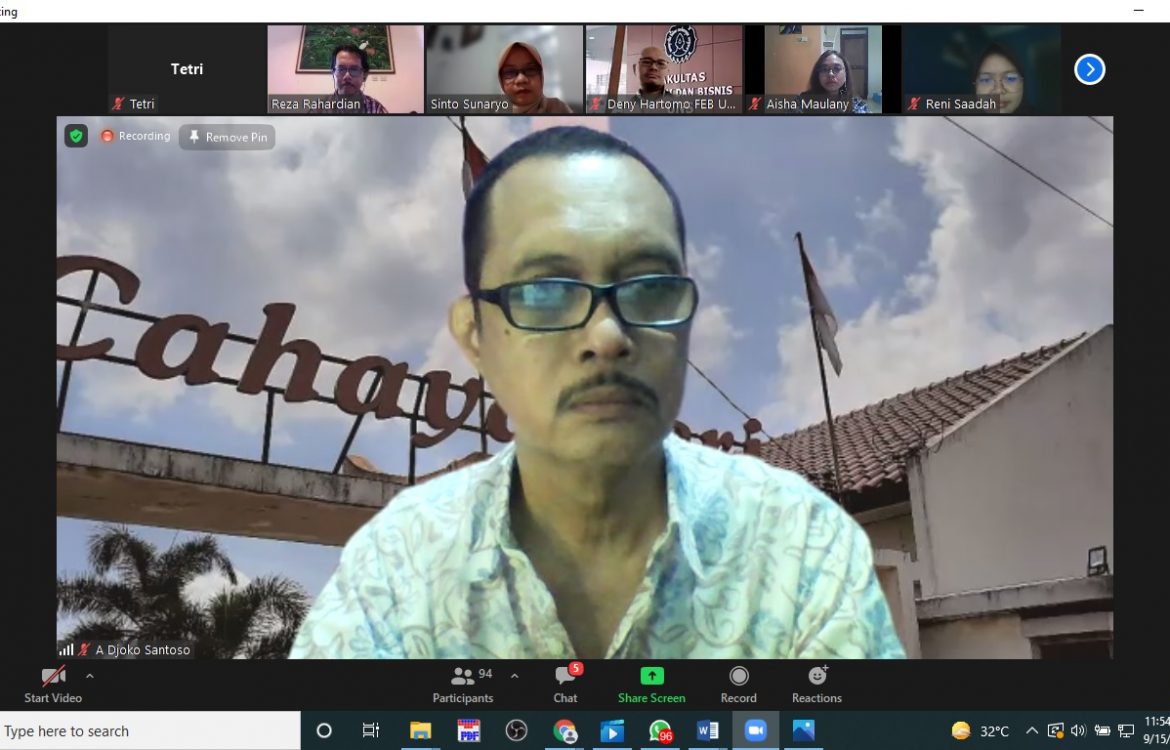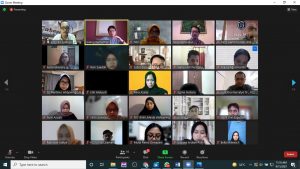
Managerial Simulation Practices Guest Lecture Discuss The Prospects of Property Business and Thematic Tourism Development
Discussion on property business will never end because the need for housing is steadily increasing. The main problem revolves around location selection and community purchasing power.
Property business is a long-term business. The economic value for property assets keeps on increasing, never decreased, it is very resistant to inflation. The most important thing about this business is the legality of the developer because many developers lack legitimacy. This business is included as a capital-intensive business because of the significant procurement need, not to mention the construction process.
 This statement was made by Djoko Santoso, a Property Business Practitioner in Solo Raya, in Guest Lecture on Managerial Simulation Practices for Property Business Prospects and Thematic Tourism Development organized by the Management Study Program, Faculty of Economics and Business (FEB) Universitas Sebelas Maret (UNS), Wednesday, 15 September 2021.
This statement was made by Djoko Santoso, a Property Business Practitioner in Solo Raya, in Guest Lecture on Managerial Simulation Practices for Property Business Prospects and Thematic Tourism Development organized by the Management Study Program, Faculty of Economics and Business (FEB) Universitas Sebelas Maret (UNS), Wednesday, 15 September 2021.
Further, Mr. Djoko reveals that the property business value is determined by four things, namely location, facilities, brand, and theme.
The main focus on determining housing construction is location. In contrast, the supporting infrastructure will be an added value in housing. The most common facilities included are roads and places of worship. Meanwhile, the brand will significantly affect the property selling power or its marketing strategy. When the housing brand is strong in a region, it will affect the marketability of the housing products.
Several housing estates have started to apply specific themes in their construction, which is usually dependent on specific consumer groups, usually for the upper-level economic community. Based on his experience in the property business, Djoko Santoso sees that the basic guidelines in property business valuation are location and target market, land price, theme or type of housing, ownership system, and marketing. “The first points to consider when choosing a location or target market are the location must be clear, and which target market we choose, whether it is the lower, middle or upper-class because this greatly affects the products we will sell and also the determined targets,” he said.
Currently, to sell property products, the marketing system is diverse. There is a housing program without a down payment and half payment program, where half of the property price can be paid in 12 installments with no interest and many others. These kinds of marketing systems are done to attract consumers. Likewise, in terms of property business capital, the alternative funding is very diverse. Previously, the only funding available was personal funds. Now we can collaborate with landowners, bank credit funding, or finding investors.
 Meanwhile, the second speaker, Gilang Ramadhan, a musician and Mentor for the Tourism Development of the Ministry of Tourism and Creative Economy, told his experience while working in the tourism sector. According to him, creativity is needed to develop the tourism sector. In developing tourism, we must pay attention to the tourists’ interest in visiting tourism places. VVIP tourists want a place that is truly original. Considering this preference, we can choose an original tourism concept.
Meanwhile, the second speaker, Gilang Ramadhan, a musician and Mentor for the Tourism Development of the Ministry of Tourism and Creative Economy, told his experience while working in the tourism sector. According to him, creativity is needed to develop the tourism sector. In developing tourism, we must pay attention to the tourists’ interest in visiting tourism places. VVIP tourists want a place that is truly original. Considering this preference, we can choose an original tourism concept.
“It is also necessary to pay attention to what can charm people around the world to visit tourist attractions in Indonesia, for example, coffee. If coffee can be a point of attraction to attract people into visiting a place, use it, and do not forget that we have to use the red and white flag as one of the identities of Indonesia,” he said.
Another thing that also needs to be done is to record visiting tourists in a relaxed and friendly way, to easily get their contact information in the event of promoting other tourist attractions. A sustainable blueprint is fundamental in developing tourism. Meanwhile, the best blueprint is from Bali. (Humas FEB).

